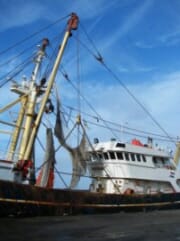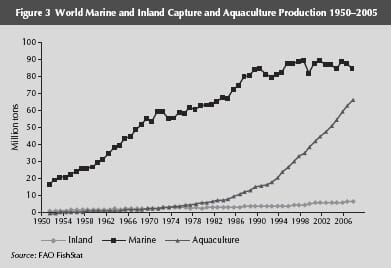
A recent study conducted by The World Bank in conjunction with the Food and Agriculture Organisation (FAO) has shown that the difference between the potential and actual net economic benefits from marine fisheries is in the order of $50 billion per year, whilst cumulative economic loss to the global economy over the last three decades is estimated at $2 trillion. The study, The Sunken Billions, attempts to justify the economic price tag of a fisheries reform.
Meanwhile, a separate FAO study says that fish farming has been, "the world's fastest growing food production sector, sustaining an annual growth rate of 8.8 per cent", since 1970. By way of comparison, livestock production, also considered a growth sector, increased at a rate of just 2.8 per cent a year during the same period.
Today, some 45 per cent of all fish consumed by humans, amassing 48 million tonnes in all, is raised on farms. Aquaculture products continue to capture an increasing share of global markets for fish, driven on by "technological advances in production", "low production costs" and "globalisation of fish trade".
The competition from aquaculture places economic stress on capture fisheries and contributes to trade disputes as farmed fish capture market share from traditional producers, but the damage caused to the maritime fisheries industry cannot be attributed to the competition of aquaculture alone.
In fact, The Sunken Billions suggests that the downfall of the industry began even before the fuel price increases of 2008. "A build up of redundant fishing fleet capacity, deployment of increasingly powerful fishing technologies, and increasing pollution and habitat loss have depleted fish stocks worldwide," claims the report.
Causes, Effects and Results
"For over three decades, the world’s marine fish stocks have come under increasing pressure from fishing, from loss of habitats, and from pollution. Rising sea temperatures and the increasing acidity of the oceans are placing further stress on already stressed ecosystems. Illegal fishing and unreported catches undermine fishery science while subsidies continue to support unsustainable fishing practices", says the report.
The Sunken Billions also says that there is an increasing proportion of the world’s marine fish stocks are either fully exploited or over exploited. This study and previous studies indicate that the current marine catch could be achieved with approximately half of the current global fishing effort.
“There is a massive overcapacity in the global fishing fleet,” said Kieran Kelleher, Fisheries Team Leader for the World Bank. “The excess fleets competing for limited fish resources result in stagnant productivity and economic inefficiency.”
But whilst the fleets have increased the wealth of the oceans has declined. At the same time, the margin has narrowed between the global costs of catching and the value of the catch. The value of the marine capture seafood production at the point of harvest is some 20 per cent of the $400 billion global food fish market. In many cases the catching operations are buoyed up by subsidies, so that the global fishery economy to the point of landing (the harvest subsector), is in deficit.
The report suggests that the recovery of these ‘sunken billions’ takes place in two main ways. First, a reduction in fishing effort to increase productivity, profitability, and net economic benefits from a fishery. Second, rebuilding fish stocks to increase sustainable yields and lower fishing costs. Some fish stock can rebuild rapidly, but the uncertain dynamics of marine ecosystems means that certain stocks may not be readily rebuilt.
"Strengthening fishing rights systems is fundamental to addressing the problems facing the sector,” said Ragnar Arnason, a fisheries economist at the University of Iceland and a co-author of the report, pointing to successful experiences in Iceland, New Zealand and Namibia.
Without a reform, the maritime sector is forecast to continue declining whilst subsidies increase.

The Rising Challenge
The FAO estimates that by 2030, with an addition of 2 billion people to the global population, aquaculture will need to produce nearly double its modern day output just to maintain current per capita consumption levels.
For the time being the growth in reported global fish production has more than kept pace with population growth, responding well to the increased demand in Asia.
A worrying exception to the aquaculture boom is Africa, the only world region where per capita consumption of fish has dropped and whose share of global aquaculture production is less than one per cent. "Africa has the full resource potential for aquaculture growth," FAO's paper said, "and should be a "priority region" for aid aimed at promoting aquaculture development."
According to a report from the University of British Columbia, global aquaculture is seen as the solution to the ever-shrinking production of wild-capture fisheries, but at a time when global aquaculture production is soaring, their research suggests that the annual rate of growth actually is actually declining
“If you look at the total volume, you see that it is increasing. But if you look the growth – the year-on-year growth rate, so you are looking at the growth rate of the growth -- then you see that it increases initially and then begins declining,” Sumaila told IntraFish. “Which is a warning to us that this growth that we see can not continue forever.”
The research should serve as a cautionary note, he said, adding the idea aquaculture can meet our protein demands and we don’t need wild fisheries probably is misplaced.
“In terms of policy, this says let’s manage our wild stocks as best we can while we develop sustainable and sensible aquaculture to compliment," he told Intrafish. "The idea that aquaculture can take over is simply a pipe dream.”

